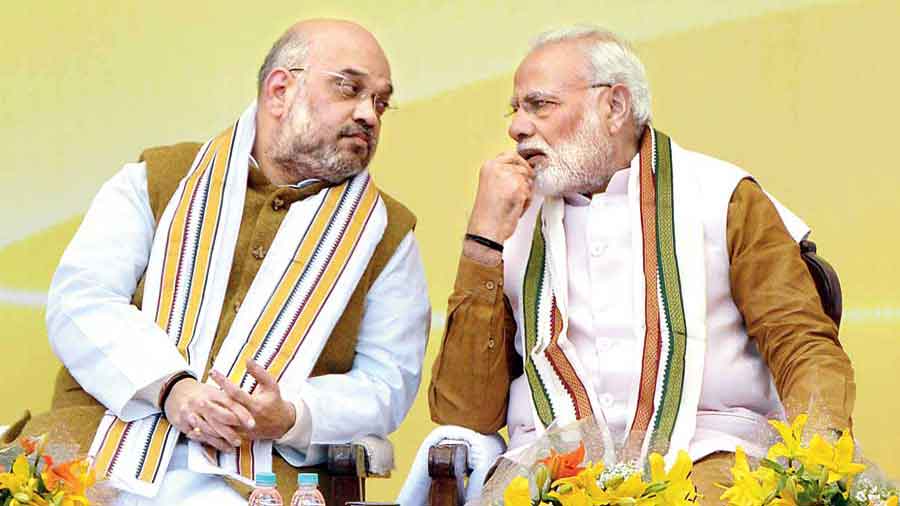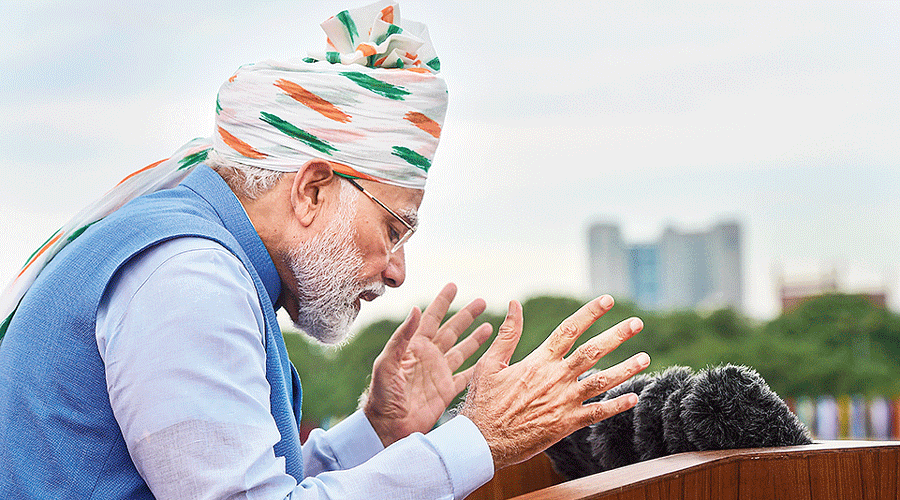The silence of Prime Minister Narendra Modi and Union home minister Amit Shah on the release of the convicted rapists and murderers in the Bilkis Bano case cannot be guided by personal, political and ethical choices. It has legal implications, too.
The Gujarat government’s release of the 11 convicts will be open to legal challenge if it is established that the state had failed to seek the Centre’s approval for the remission of the life terms despite the case having been investigated by the CBI.
So far, neither the Gujarat government nor the Modi-headed Centre has shed light on whether the Union government’s consent was taken in spite of the Opposition asking the specific question on August 17.
Congress spokesperson Pawan Khera had asked on Wednesday: “Both the Prime Minister and home minister Amit Shah are from Gujarat. They should disclose whether the state government sought their permission to release the rape-and-murder convicts. If permission was granted, make it public…. If no approval was sought, they should explain what action will be taken against the Gujarat chief minister.”
The Centre is yet to answer. Government sources in Gujarat told this newspaper that they were not aware that consent had been taken.
A five-judge constitution bench of the Supreme Court had in a 2015 judgment, relating to a Rajiv Gandhi assassination convict, made the Union government’s permission mandatory for remission if the case involved a central investigative agency.
However, on May 13 this year, the two-judge apex court bench of Justice Ajay Rastogi and Justice Vikram Nath held that the power of remission in the Bilkis Bano case was vested with the Gujarat government as the crime had been committed in that state.
A pregnant Bilkis was gang-raped and seven of her family members, including her three-year-old child, were murdered during the 2002 riots.
In 2004, the apex court had transferred the case to the CBI following allegations of bias on the part of Gujarat police, and the trial was shifted to Maharashtra.
The May 13 verdict by the two-judge bench can be termed “per incuriam” (showing lack of due regard to the relevant law or facts) as it was decided without reference to earlier Supreme Court judgments, particularly the five-judge ruling of December 2, 2015.
The five-judge bench included Justice U.U. Lalit, who is now the Chief Justice of India-designate. It was headed by then Chief Justice of India H.L. Dattu, and the other judges were Justice Ibrahim Kalifullah (who authored the main judgment), Justice P.C. Ghose and Justice A.M. Sapre. Except for Justice Lalit, the rest have retired.
In the 2015 case, involving one of the convicts in Rajiv Gandhi’s assassination, V. Sriharan aka Murugan, the Narendra Modi government had argued successfully that only the Centre had the power to commute the sentence since the matter had been investigated by the CBI.
This time, whether or not the Gujarat government sought its permission, the Modi government has said or done little in public after the remission decision was carried out. The Modi government has not displayed the alacrity it had shown in the 2015 case when the Tamil Nadu government, for its own political reasons, sought to release the Rajiv assassination convict on the ground that he had completed more than 14 years in prison.
Besides, the Gujarat government relied on a 1992 state policy on remission to release the 11 lifers, despite central guidelines issued in 2014 asking the states not to remit the sentences of those convicted of heinous crimes like rape and murder.
While the May 13 judgment has complicated matters, both Bilkis Bano and the Centre have the legal option of challenging it through a review petition.
If Bilkis Bano does not challenge the release, it will become a test case for the Centre to move a review petition, for the federal structure does not give it the executive authority to rescind the Gujarat government’s controversial decision.
The five-judge bench had in 2015 ruled that not only did the Union government hold sole power to grant remission in cases investigated by central agencies, it could grant the remission even if the President or the governor had rejected appeals for the relief.
“In a case where the investigation is thus handed over to the CBI, entire carriage of the proceedings including decisions as to who shall be the public prosecutor, how the prosecution be conducted and whether appeal be filed or not are all taken by the CBI and at no stage the concerned state government has any role to play,” the bench had ruled.
“It would not then be appropriate to allow the same state government to exercise power under Section 432 and 433 (of the CrPC, relating to the executive’s powers of remission) on its own and in such matters, the opinion of the central government must have a decisive status. In cases where the investigation was so conducted by the CBI or any such central investigating agency, the central government would be better equipped and likely to be more correct in its view.”
The May 13 judgment by the two-judge bench was passed on a plea from one of the Bilkis case convicts, Radhe Shyam Bhagwandas Shah, who had challenged a Gujarat High Court ruling that said the Maharashtra government alone had the power of remission since the sentence had been imposed by a sessions court in that state.
The two-judge apex court bench ruled that the Gujarat government alone had the power of remission since the crime was committed within its territory, and that the shift of the trial to Maharashtra did not take away this power.
But senior advocate Rebecca John told LiveLaw, the portal, two days ago that “it doesn’t matter where the offence was committed. The appropriate government for grant of remission is the government of the state in which trial was held. So, the remission should have been moved before the Maharashtra government and not Gujarat.”
John added: “I am in respectful disagreement with the portion of the Supreme Court judgment (which held that the Gujarat government has to consider the remission as the crime took place in Gujarat). I believe a review petition must be filed.”
However, had the remission petition been filed before the Maharashtra government after June 30, the outcome would unlikely have been different as the BJP had by then become a partner in power in the state after the Shiv Sena defections.











